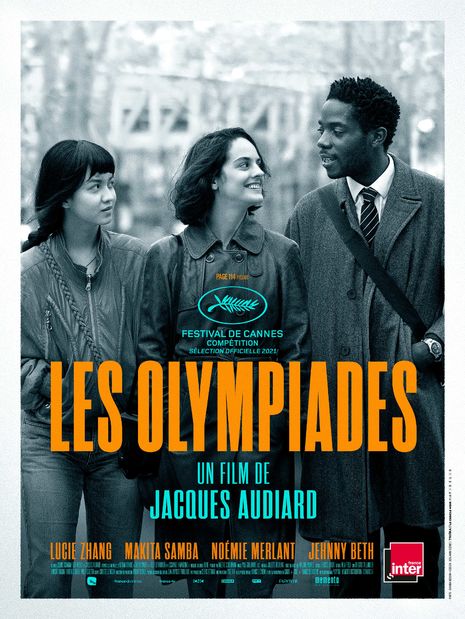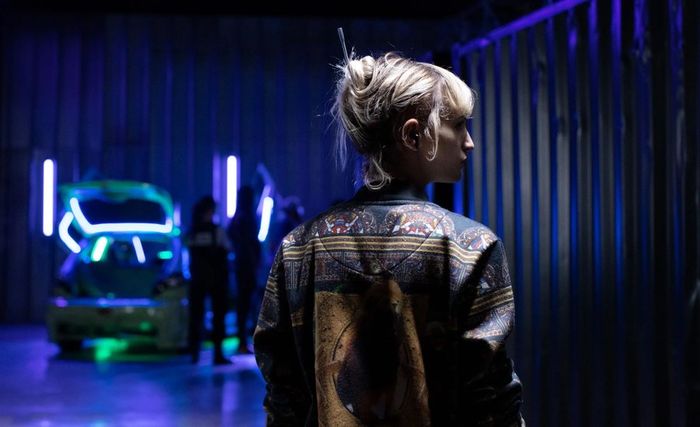Review: ‘Paris, 13th District’
Fancy watching a French film? Raphael Lasserson-Rossiter reviews this film’s artistic endeavour into modern romance

According to the stereotype in the popular British imagination, French film is just arty sex scenes. I have also heard this preconception extend itself to many other areas of foreign film, leading to various lewd jokes about some of the films that I study in Part II of MML from some of my peers. After watching Jaques Audiard’s Paris, 13th District (2021) in the cinema of London’s Institut Français, I was reminded of the origins of this exoticising, reductionist view of cinema from across the channel. And yet, for all its racy intimacy shot in delicate black and white, the film struck me as going far beyond this. Instead, it offers a raw insight into the intense fluctuations between closeness and separation that characterise modern relationships.
Set eponymously in Paris’ 13th arrondissement, we follow the stories of several parallel and interwoven relationships. First, we meet Émilie (Lucie Zhang), an overqualified call centre operator, who welcomes Camille (Makita Samba), a young male teacher, into her flat as her new roommate. The two swiftly sleep together, only for Émilie to quickly fall for Camille. Initially, Camille does not feel quite the same way; they both move out, and their liaison peters out.
And then, enter Nora (Noémie Merland): a mature student. Keen to come across as young among her mocking teenage peers, she turns up to a student party in a blonde wig. A group of boys think that she is a live chat porn actress called Amber Sweet (Jehnny Beth), who wears a similar blonde wig. They spread the lie like wildfire, and cause the distraught Nora to drop out. She gets in contact with the real Amber Sweet via the latter’s paid livestream, and the two strike up an online relationship.
To complicate matters further, Nora gets a job as an estate agent and meets Camille, who has also switched to the industry. They begin a relationship at the same time as Nora remains in online contact with Amber Sweet. Seemingly, it’s all just another arthouse representation of everyone shagging each other; c’est simple comme bonjour, non? To this, I say non.
“Audiard’s careful cinematography highlights the paradoxical absence of closeness between modern couples”
For me, Audiard’s careful cinematography highlights the paradoxical absence of closeness between modern couples. When Émilie and Camille begin their friends with benefits arrangement, they often go from having sex in very haptically shot sequences, complete with handheld camera closeups, to not even being in the same shot once they are done. They are still right next to each other, chatting naked in their small flat, yet they could be talking to each other over the phone. In the blink of an eye, Audiard shows us how, despite their literal closeness, the parties in the modern couple can be further away from each other than ever.
The film’s representations of internet relationships vs real-life sex also strikes a chord. Camille and Nora’s sex life is fraught with frustration and confusion for Nora, making her online relationship with Amber Sweet closer and more intense. At one point, the two even sleep with their webcams on for the entire night. Merland certainly puts on some very convincing lovestruck eyes as her character drifts off to sleep in front of her computer screen. In the dwelling close-up of her eyes, we see far more affection than when she is physically intimate with Camille.
Although lockdown is never explicitly mentioned, I couldn’t help but see this as a reminder that Zoom dates and relationships, although literally possible pre-covid, are upon us and here to stay. While the stories of these relationships that I have heard in real life tend more towards the weird rather than the romantic, Audiard simply reminds us that it is indeed possible for the internet to usurp traditional notions of intimacy.
"Paris, 13th District subtly articulates our modern age”
This idea of distance and technology is the defining image that I was quite literally left with at the end. When Camille finally declares his love for Émilie, he does it over the intercom in her flat. I was expecting Émilie to call out this ordinarily scumbag delivery, but she is instead clearly touched. She jokingly asks him to repeat his ‘je t’aime’ louder, leaving those crackly words reverberating in our ears as the film ends. The final image is a zoom on the phone. This piece of technology synonymous with interpersonal distance is left as the key to the highest degree of human affection. And it’s all blissfully normal.
Far from propping up hackneyed old stereotypes about an excess of sex in French film, Paris, 13th District subtly articulates our modern age that at once depersonalises actual sex and privileges connections enabled by technology. As it turns out, even the most romantic city in the world has not been spared these sweeping changes in relationships and sex.
 News / Caius mourns its tree-mendous loss23 December 2025
News / Caius mourns its tree-mendous loss23 December 2025 News / Clare Hall spent over £500k opposing busway 24 December 2025
News / Clare Hall spent over £500k opposing busway 24 December 2025 Comment / The ‘class’ of Cambridge24 December 2025
Comment / The ‘class’ of Cambridge24 December 2025 Interviews / Politics, your own way: Tilly Middlehurst on speaking out21 December 2025
Interviews / Politics, your own way: Tilly Middlehurst on speaking out21 December 2025 Comment / Yes, I’m brown – but I have more important things to say22 December 2025
Comment / Yes, I’m brown – but I have more important things to say22 December 2025








